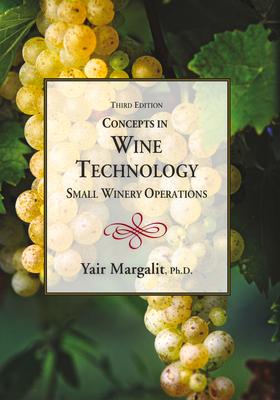Following up on his bestselling Winery Technology and Operations, physical chemist and winemaker Yair Margalit comes out with the successive, Concepts in Wine Technology, fully updated and revised to meet the advances of modern winemaking. Among the extended topics are fermentation, skin contact, acid balance, phenolics, bottling, the use of oak and quality control. He begins in the vineyard discussing proper maturation, soil and climate, bunch health, vineyard disease states, and grape varieties. Next he tackles the preharvest with a careful look at vineyard management and preparing the winery for harvest. Dr. Margalit then outlines the entire process of harvesting, from destemming, crushing, and skin contact as it applies to both red and white grapes to pressing, must correction, and temperature control. Fermentation is examined fully and includes a lengthy look at the factors affecting malo-lactic fermentation and its pros and cons. There is a chapter on cellar operations that deals with racking, stabilization, fining, filtration, blending, and maintaining winery hardware, followed by sections on barreling and bottling. The final chapter pulls together the more general aspects of wine technology, covering sulphur-dioxides, different forms of wine spoilage and ways to ward them off, legal regulations and, one of the most important and enigmatic compounds in wine, phenolics.

Concepts in Wine Technology, Small Winery Operations 3rd Edition
Following up on his bestselling Winery Technology and Operations, physical chemist and winemaker Yair Margalit comes out with the successive, Concepts in Wine Technology, fully updated and revised to meet the advances of modern winemaking. Among the extended topics are fermentation, skin contact, acid balance, phenolics, bottling, the use of oak and quality control. He begins in the vineyard discussing proper maturation, soil and climate, bunch health, vineyard disease states, and grape varieties. Next he tackles the preharvest with a careful look at vineyard management and preparing the winery for harvest. Dr. Margalit then outlines the entire process of harvesting, from destemming, crushing, and skin contact as it applies to both red and white grapes to pressing, must correction, and temperature control. Fermentation is examined fully and includes a lengthy look at the factors affecting malo-lactic fermentation and its pros and cons. There is a chapter on cellar operations that deals with racking, stabilization, fining, filtration, blending, and maintaining winery hardware, followed by sections on barreling and bottling. The final chapter pulls together the more general aspects of wine technology, covering sulphur-dioxides, different forms of wine spoilage and ways to ward them off, legal regulations and, one of the most important and enigmatic compounds in wine, phenolics.